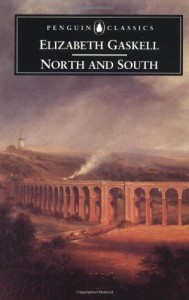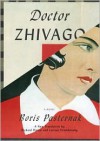
Short version: This, for me, is the best Victorian novel. (Yes, better than Dickens. Interestingly, Dickens was Gaskell's colleague, and they frequently argued about how she should write.) Gaskell apparently wrote this novel to break gender barriers: her female character is the strong and stoic hero of the book, and John Thornton is her more reflective, emotional equal. Long version: Margaret Hale is, at first glance, your typical Victorian lady: she comes from a picturesque English country village, keeps herself out of unsavory company, lives with her pastor father and her ladylike mother in a rectory, and claims to only want the simplest things out of life. She, however, is not romantic and promptly turns away from emotionless courtship; she does not believe in marrying out of security. Yet, her circumstances change when her father abruptly retires from his sunny rectory and moves everyone up north to the cold and harsh city of Milton. Mr. Hale becomes a tutor for some of the less educated members of the city. Not everyone in the family responds well to Milton. Margaret hates everything about it--how rude everyone is, the icy weather, the smoke, and the almighty importance everyone gives business. Unbeknowst to her, Milton is on the verge of a workers' strike, making Milton an even more frightening place. Meanwhile John Thornton runs a cotton mill in Milton, has a frivolous sister, and an insanely [bitchy] overbearing mother. John's early entrance into the business world took him out of traditional schooling, and he becomes Mr. Hale's student. He also meets Margaret and instantly falls in love. (Being a bit of a charmer, you would expect him to be suave. However, he has difficulty sorting his feelings, and instead makes awkward small talk involving fruit and gets irrationally sensitive about his mill.)But his respect for Margaret, not just his emotional interest, are what really make his character. While John and Margaret's interactions have an emotional resonance to them, both because they view one another as equals and because of the friction of their circumstances, it is the workers' drama that really sucks you in. Gaskell unflinchingly depicts the starving slums of north England and bravely shows the juxtaposing universes between the upper and lower classes. As Margaret befriends some of the workers and becomes involved in their plight, she is forced to shed her idealized version of the world and choose between the mill-owners and those they mistreat. This one of my favorite books, and I still reread it for the industrial drama and the John/Margaret chemistry. I definitely recommend it.
 Short version: This, for me, is the best Victorian novel. (Yes, better than Dickens. Interestingly, Dickens was Gaskell's colleague, and they frequently argued about how she should write.) Gaskell apparently wrote this novel to break gender barriers: her female character is the strong and stoic hero of the book, and John Thornton is her more reflective, emotional equal. Long version: Margaret Hale is, at first glance, your typical Victorian lady: she comes from a picturesque English country village, keeps herself out of unsavory company, lives with her pastor father and her ladylike mother in a rectory, and claims to only want the simplest things out of life. She, however, is not romantic and promptly turns away from emotionless courtship; she does not believe in marrying out of security. Yet, her circumstances change when her father abruptly retires from his sunny rectory and moves everyone up north to the cold and harsh city of Milton. Mr. Hale becomes a tutor for some of the less educated members of the city. Not everyone in the family responds well to Milton. Margaret hates everything about it--how rude everyone is, the icy weather, the smoke, and the almighty importance everyone gives business. Unbeknowst to her, Milton is on the verge of a workers' strike, making Milton an even more frightening place. Meanwhile John Thornton runs a cotton mill in Milton, has a frivolous sister, and an insanely [bitchy] overbearing mother. John's early entrance into the business world took him out of traditional schooling, and he becomes Mr. Hale's student. He also meets Margaret and instantly falls in love. (Being a bit of a charmer, you would expect him to be suave. However, he has difficulty sorting his feelings, and instead makes awkward small talk involving fruit and gets irrationally sensitive about his mill.)But his respect for Margaret, not just his emotional interest, are what really make his character. While John and Margaret's interactions have an emotional resonance to them, both because they view one another as equals and because of the friction of their circumstances, it is the workers' drama that really sucks you in. Gaskell unflinchingly depicts the starving slums of north England and bravely shows the juxtaposing universes between the upper and lower classes. As Margaret befriends some of the workers and becomes involved in their plight, she is forced to shed her idealized version of the world and choose between the mill-owners and those they mistreat. This one of my favorite books, and I still reread it for the industrial drama and the John/Margaret chemistry. I definitely recommend it.
Short version: This, for me, is the best Victorian novel. (Yes, better than Dickens. Interestingly, Dickens was Gaskell's colleague, and they frequently argued about how she should write.) Gaskell apparently wrote this novel to break gender barriers: her female character is the strong and stoic hero of the book, and John Thornton is her more reflective, emotional equal. Long version: Margaret Hale is, at first glance, your typical Victorian lady: she comes from a picturesque English country village, keeps herself out of unsavory company, lives with her pastor father and her ladylike mother in a rectory, and claims to only want the simplest things out of life. She, however, is not romantic and promptly turns away from emotionless courtship; she does not believe in marrying out of security. Yet, her circumstances change when her father abruptly retires from his sunny rectory and moves everyone up north to the cold and harsh city of Milton. Mr. Hale becomes a tutor for some of the less educated members of the city. Not everyone in the family responds well to Milton. Margaret hates everything about it--how rude everyone is, the icy weather, the smoke, and the almighty importance everyone gives business. Unbeknowst to her, Milton is on the verge of a workers' strike, making Milton an even more frightening place. Meanwhile John Thornton runs a cotton mill in Milton, has a frivolous sister, and an insanely [bitchy] overbearing mother. John's early entrance into the business world took him out of traditional schooling, and he becomes Mr. Hale's student. He also meets Margaret and instantly falls in love. (Being a bit of a charmer, you would expect him to be suave. However, he has difficulty sorting his feelings, and instead makes awkward small talk involving fruit and gets irrationally sensitive about his mill.)But his respect for Margaret, not just his emotional interest, are what really make his character. While John and Margaret's interactions have an emotional resonance to them, both because they view one another as equals and because of the friction of their circumstances, it is the workers' drama that really sucks you in. Gaskell unflinchingly depicts the starving slums of north England and bravely shows the juxtaposing universes between the upper and lower classes. As Margaret befriends some of the workers and becomes involved in their plight, she is forced to shed her idealized version of the world and choose between the mill-owners and those they mistreat. This one of my favorite books, and I still reread it for the industrial drama and the John/Margaret chemistry. I definitely recommend it.










